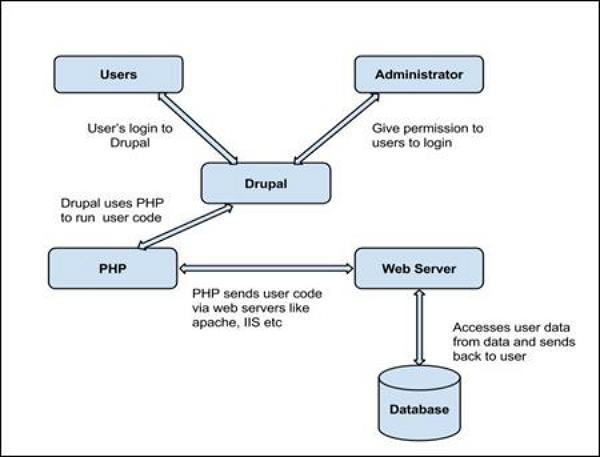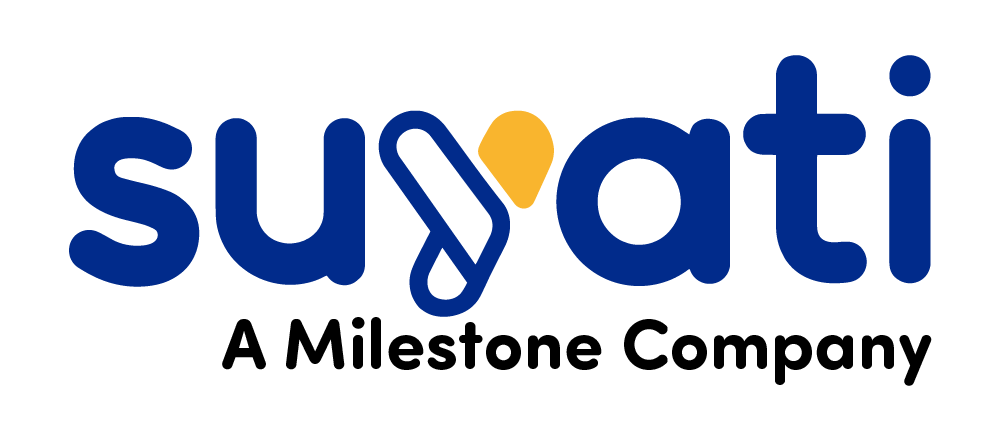
What is Drupal?
Drupal is an open-source CMS (Content management software) software written in PHP language. From personal bloggers to government and corporate websites use Drupal for knowledge management, digital experience management, and business collaboration.
What makes Drupal stand out among other CMS?
Although Drupal is popular as a CMS, it is also often referred to as a web application framework. Perhaps this offering, which combines sophistication and ease of use is what makes Drupal a popular CMS software. It is equally appealing to developers who need sophisticated APIs and for users who need to build websites or blogs with no prior programming experience or skills. To top it all, Drupal has an active support community that offers vast resources for anyone, even beginners, to become experts in using the CMS software.
Under The Hood — Breaking Down Drupal’s Architecture
Drupal’s architecture is made up of six components:
- Users
- Administrator
- Drupal
- PHP
- Web Server
- Database

Users
The actual folks who use the CMS on a daily basis. This could be website admins, blog editors, business owners, content creators, etc.
Administrator
The key person who manages and controls the website. This person will be responsible for setting up user access privileges for accessing, editing, and managing content on the Drupal website.
Drupal
The Drupal core takes all the load of processing content information, managing its storage, granting or rejecting access to users based on their requests, and so on.
PHP
The programming language used to create Drupal. PHP is also used when building site functionalities, new features, or making tweaks to the website to customize it. PHP also enables users to create complex workflows and forms.
Web Server
The node in the entire architecture where data is collected and user requests are collated and served over HTTP requests. Drupal allows for user-server interaction through web services like Apache, IIS, Nginx, Lighttpd, etc.
Database
The virtual warehouse where all website data, user information, content, and every other data is hosted. Drupal uses its database to access, edit, and retrieve information as per admin or user requests.
READ : Drupal 9 is here. Should you upgrade?
Top 3 Use cases for Drupal Content Management Software
As mentioned in the beginning, Drupal is a CMS software at its core. It can also double up as a web application framework. This creates a long list of use cases that are not restricted to content management alone.
Broadly, Drupal is used for three main use cases:
- Building websites of all types
- Storing content of diverse formats
- Creating content publishing workflows
Building websites of all types
For a layman, a website is just a single page on the website that serves up information when needed. However, the internet is made up of several types of websites, each one serving a specific utility.
For example, blogs are a collection of articles that may or may not have a chronological order, whereas a news website is a real-time information spewing web page. Both types of websites will have starkly different page layouts, functionalities, user interactive elements, and so on.
Similarly, there are other types of websites on the internet, like eCommerce websites, banking websites, online shopping websites, social networking websites, business services websites, individual portfolios, etc.
Drupal is a reliable CMS software that enables users to build any type of website (mentioned above and more). The point worth noting is that it doesn’t demand programming skills to launch basic websites. However, programming skills will definitely be an added advantage.
Storing content of diverse formats
Content refers to text, audio-video, or any other format of content that the user can access, modify, or retrieve from time to time. One of the key tasks of a CMS is to facilitate that process, which is what Drupal is also good at.
Drupal treats each piece of content as a node. A node could be an article in a blog, a poll, a web page with forms or interactive elements, etc. depending on the user’s requirements. Custom content types can also be created and stored on the Drupal server. Using several web services like Apache, Nginx, etc. users can access and modify those files.
Creating content publishing workflows
Drupal allows managers and editors of large content volumes to automate their content publishing workflow. Drupal workflows create a framework that helps in managing content across several stages and transitions.
For example, in a blog publishing scenario, Drupal enables a content editor to manage content in ‘Draft’ mode, move them to ‘Published’ mode, etc. The Content Moderation core module in Drupal allows for this convenience.
By default, Drupal offers three workflows:
- Draft
- Published
- Archived
If further revisions of complex nature are required, Drupal 8 allows for that by extending and customizing the content publishing workflow.
READ : Drupal 8 Modules Development Through Step by Step Guide
Top 10 USPs of Drupal
Drupal has several USPs that make it a popular CMS. Here are the 10 top reasons.
- Any Kind of Content
Just about any kind of content is possible with Drupal. You visualize and Drupal makes it a reality for you. With the Content Construction Kit (CCK), you are empowered with the kind of flexibility that very few CMS offers. The CCK provides about thirty different kinds of content, each different and unique from the other. You can throw in as little or as much as complex content into the mixture like dynamic fields or listings, yet Drupal makes it seem like a cakewalk.
- Comprehensive Views
You can decide just about everything regarding how you want the content to appear on your website with the view feature of Drupal. You can define a particular way an article appears on the site, define the archive list, or even use a combination of standard and custom features. For instance, if you prefer keeping a custom view intact but want the taxonomy view tweaked a little, Drupal allows you to do it.
- SEO Power
Who can deny the power of SEO (Search Engine Optimization) which is the primary source of all the traffic that comes to your website? Drupal can safely be coined as the king of SEO in this regard with features that can customize your URLs (with Pathauto), and offer complete control over page titles and with caching the pages. That is not all. These features, in conjunction with analytic tools, make Drupal a leader in the field of social media and CRM.
- Taxonomy never a taxing job
Taxonomy is defined as the science of classification. Taxonomy is used to optimize features like navigation, search, and personalization on a website. Drupal has a defined set of categories (tag names) applicable to a specific type of content making it extremely easy to add tags, meta- tags to your content. You can also build a hierarchy of keywords that can be applied to classify the content.
- E-commerce done smoothly
If you are an e-commerce business, then Drupal’s Ubercart is a dream-come-true feature for you. The variety of options range from categorizing and displaying your products to applying promotional codes/discounts and calculating shipping charges, to having a workflow facilitating automatic order processing and single page checkout to providing simple and secure payment gateway options. In a nutshell, it does much more than selling products.
- Being social is second nature
Every business needs to be social these days and with Drupal, this is a done deal, because it is inherently a social platform that is well-integrated with social sites like Facebook, Twitter, and Google+. Be it sharing or promoting your content, engaging with your customers, requesting them to share feedback, all of this is possible with social media modules in Drupal.
- Deftly manage different level users
With Drupal, you can create as many custom users as you need and assign varied roles to each of them. You are in full control of the member profiles, their scope of access, and the extent of inter-member communication.
- Accommodates a growing business
Businesses that are looking to expand and grow fast or expecting increased footfalls to their website need a robust CMS that accommodates their requirements. With Drupal, you will never have to worry about the increase in traffic. It is built to accommodate and respond well to high traffic and load levels.
- Professional looking website
Drupal has a versatile theming system in place. Whether you are a new user looking to use standardized themes or an advanced user who wants to customize and build over a basic theme, Drupal offers a good number of options. Even the standardized themes do not look like the typical free-websites. They are designed to give your website a clean and professional feel and appearance.
- Large supportive community
The Drupal community has members from all around the world. They share tips, tricks, tutorials, and helpful advice that enables even amateur users to make the most out of the CMS software. The community activities are not restricted to that. Users can report bugs, connect with Drupal experts near their current location, or even land a job working with Drupal. One can also find Documentation of scripts, modules, and core updates that are released for the platform from time to time.

